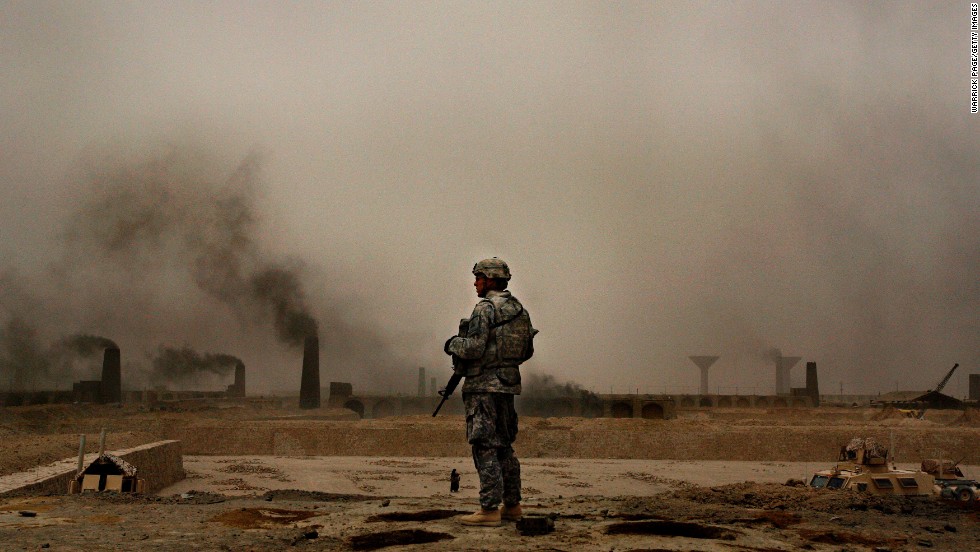Lessons from Iraq War
March 26, 2018 | Expert Insights

March 20th, 2018 marked the fifteenth anniversary of the controversial Iraq War initiated by America. Experts used the occasion to warn Washington of the dangers inherent in a hawkish outlook.
Background
On September 11, 2001, there were a series of coordinated terror attacks in USA. Four planes from major airlines were hijacked by 19 members belonging to the al Qaeda terror outfit. Two of these planes flew right into the Twin Towers, which were part of the World Trade Center (WTC). The two towers collapsed as a result of the collision. The third plane crashed into the Pentagon. The fourth plane was meant to crash in Washington. However, the passengers tried to take control of the plane and as a result it crashed into a field in Pennsylvania.
The invasion of Afghanistan began as a result of the terror attack. The Iraq War also began part of a declared war against international terrorism and its sponsors under the administration of U.S. President George W. Bush following the terror attacks. The armed conflict began in 2003 with the invasion of Iraq by a United States-led coalition that overthrew the government of Saddam Hussein. The conflict continued for much of the next decade as an insurgency emerged to oppose the occupying forces and the post-invasion Iraqi government. An estimated 151,000 to 600,000 or more Iraqis were killed in the first 3–4 years of conflict. The U.S. became re-involved in 2014 at the head of a new coalition; the insurgency and many dimensions of the civil armed conflict continue.
One of the reasons cited by the Bush administration for initiating the war was the assertion that Iraq possessed weapons of mass destruction (WMDs). However, during the war it became evident that there was no substantial evidence was found to verify the initial claims about WMDs. In addition, claims of Iraqi officials collaborating with al-Qaeda were proven false. This caused a major controversy internationally. In addition, critics have assailed the U.S. and its allies for not devoting enough troops to the mission, not adequately planning for post-invasion Iraq, and for permitting and perpetrating widespread human rights abuses.
Analysis
March 20th, 2018, marked the fifteenth anniversary of the Iraq war. Experts used the occasion to highlight the current state of American democracy and reflected on whether Washington learned lessons from the war.
Jeremi Suri, the Mack Brown Distinguished Chair for Leadership in Global Affairs at The University of Texas at Austin in an op ed for CNN stated, “We should not regret Saddam's overthrow, but we must also recognize the war did not bring the promised benefits for the United States. Simply put, we should resolve not to repeat the mistakes of the past. We may despise foreign dictators, but using military force to overthrow threatening regimes creates more problems than it solves. That is the main lesson of the Iraq War. We are better off investing in other forms of leverage that include foreign allies, international institutions and direct negotiations, even with those we wish to remove.”
Nicholas Kristoff from the New York Times highlighted how the war led to the rise of other problems and terror groups such as ISIS. He wrote, “The war helped trigger the Syria war, the genocide against the Yazidi and Middle East Christians, the rise of the Islamic State, the strengthening of Iran and a broader Sunni-Shiite conflict in the Middle East that will claim lives for years to come.”
He also presented a warning to the world that America may be gearing up for another war. Some have likened US President Trump’s rhetoric to the hawkish tone set by former Vice President Dick Cheney. Kristoff has also warned that the current administration could go to war wit Iran given its present aggressive stance against the nation. He wrote, “The risk is that Iran responds by restarting its nuclear program. This would lead to soaring tensions, the possibility of an Israeli strike on Iran, a risk of Saudi-Iranian conflict and a danger of war between the United States and Iran.”
Assessment
Our assessment is that the current US president has already threatened to wage war against North Korea and has spoken aggressively about Iran. As ties continue to deteriorate with Iran, there are fears that by nullifying the nuclear deal, the US would be creating another state whose activities cannot be monitored. Another protracted war in the Middle East would devastate not only the region but would become a highly expensive task for America. It was during the Iraq War when China emerged as an economic and global powerhouse and another war could further diminish US’ status in geopolitics.








Comments